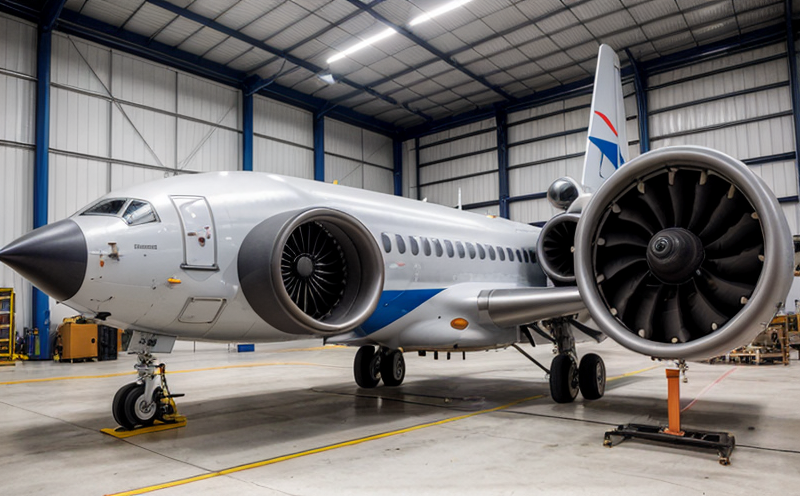Avionics Equipment Vibration Qualification (RTCA DO-160)
The Avionics Equipment Vibration Qualification Test per RTCA/DO-160 standard is a critical process for ensuring the reliability and durability of avionics equipment in aerospace environments. This test evaluates the ability of electronic components to withstand mechanical stresses such as vibration, shock, and temperature variations during flight.
RTCA/DO-160G is an American standard for environmental conditions and methods of environmental testing. It provides recommendations on how to qualify avionics equipment for use in various aerospace environments. Vibration qualification tests are conducted according to the requirements specified by the relevant sections of this document, which include RTCA/DO-160G.
During these tests, avionics equipment is exposed to controlled vibrations and shocks designed to simulate the real-world conditions they will encounter in service. The purpose of this testing is to identify potential issues early on, ensuring that only reliable and robust components are used in aircraft systems.
The process involves several steps, including initial setup, specimen preparation, environmental control, vibration excitation, monitoring, and post-test evaluation. Specimens are typically mounted onto a test stand or fixture designed specifically for the equipment being tested. Environmental conditions such as temperature and humidity may also be controlled during testing to ensure accurate results.
Instrumentation plays a crucial role in this process, with various sensors used to measure parameters like acceleration, displacement, velocity, and force. These measurements help operators monitor the specimen's response throughout the test cycle, allowing for real-time adjustments if necessary. After completing all prescribed tests, the specimens are inspected visually and functionally tested to ensure they meet specified performance criteria.
The results of these tests provide valuable insights into the durability and reliability of avionics equipment under extreme conditions. This information is essential for maintaining safety standards in aviation by ensuring that only reliable components are incorporated into aircraft systems.
Given the critical nature of avionics equipment, it is imperative to adhere strictly to RTCA/DO-160 standards when performing these tests. Compliance with this standard not only ensures product quality but also contributes significantly towards meeting regulatory requirements set forth by organizations such as the Federal Aviation Administration (FAA).
In summary, the Avionics Equipment Vibration Qualification Test according to RTCA/DO-160 is a vital procedure for assessing the resilience of avionics components against mechanical stress. By following prescribed methods outlined in this standard, manufacturers can produce high-quality products that meet stringent industry expectations and regulatory requirements.
Benefits
Conducting Avionics Equipment Vibration Qualification Tests brings numerous advantages to aerospace companies engaged in research and development activities. Ensuring compliance with RTCA/DO-160 standards helps manufacturers produce reliable products that can withstand harsh environmental conditions encountered during flight.
- Enhanced Product Reliability: Rigorous testing ensures that only robust components make it into aircraft systems, reducing the likelihood of failures in critical areas like avionics.
- Informed Decision Making: Detailed test results offer valuable insight into product performance under extreme conditions. This knowledge enables informed decisions regarding design improvements and material selection.
- Achieving Regulatory Compliance: Adhering to RTCA/DO-160 standards facilitates compliance with international regulations, thereby streamlining the certification process for new products.
- Improved Safety Standards: By ensuring that avionics equipment meets stringent reliability criteria, these tests contribute significantly towards maintaining high safety standards in aviation.
In addition to enhancing product quality and achieving regulatory compliance, conducting Vibration Qualification Tests according to RTCA/DO-160 also promotes innovation by providing feedback on existing designs. This allows manufacturers to refine their products continuously based on actual test outcomes rather than theoretical assumptions.
Eurolab Advantages
As a leading laboratory specializing in acoustics, vibration, and noise testing for aerospace applications, Eurolab offers unparalleled expertise and state-of-the-art facilities. Our experienced team of engineers ensures that every test conducted adheres strictly to RTCA/DO-160 standards, providing accurate and reliable results.
- Comprehensive Test Capabilities: We offer a full range of testing services tailored specifically for aerospace applications, including vibration, shock, altitude, temperature cycling, and more.
- Accurate Environmental Control: Our advanced laboratories feature precise climate control systems that maintain consistent environmental conditions throughout the test cycles. This ensures accurate measurement and reproducible results.
- State-of-the-Art Equipment: Equipped with cutting-edge instrumentation, our labs employ sophisticated sensors capable of capturing minute details about specimen behavior during testing. This allows for detailed analysis and interpretation of data collected.
- Comprehensive Reporting Services: After completing each test, Eurolab provides comprehensive reports detailing all aspects of the testing process, including raw data, visual inspections, functional tests, and any observations made during the procedure.
We pride ourselves on delivering top-notch service backed by years of experience in aerospace testing. Whether you need assistance with initial setup or require expert interpretation of complex test results, our team is here to help every step of the way.





